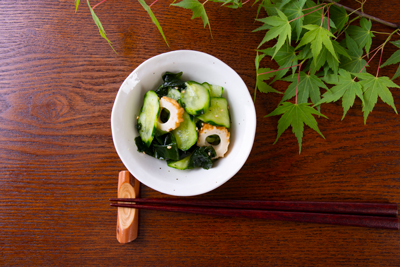Research News
Jul 15, 2022
Men over 40 who regularly eat sunomono more likely to be in lower blood pressure category
Vinegar-based Japanese side dish provided an opportunity for first observational study of dietary vinegar’s health benefits
Osaka, Japan – An observational study led by Professor Hiroaki Kanouchi from Osaka Metropolitan University presents the first evidence that eating sunomono – a Japanese vinegared side dish – correlates to lower blood pressure categorization in men.
“The benefits of vinegar in a healthy diet are well known. Our research is the first observational study of these benefits; we didn’t ask participants to change anything,” explained Professor Kanouchi.
The Japanese side dish sunomono is made with fresh cucumbers or seaweed, served in rice vinegar and often garnished with seafood.

Previous studies have shown that subjects drinking 30 mL of vinegar daily had lower blood pressure but also lost weight that could account for the lower blood pressure. Sunomono provided an opportunity to conduct an observational study to examine if vinegar consumption as part of a normal diet correlated to differences in blood pressure.
Sunomono is a traditional side dish made with sliced cucumber or seaweed in rice vinegar, often with seafood garnish. It is a normal food, regularly eaten by older generations in Japan, with individually prepackaged portions available for purchase in supermarkets, making it a common source of larger volumes of dietary vinegar.
This led the research team to recruit 1498 men and women over 40 years old who were screened for hypertension or other disqualifying health conditions. 746 participants had their blood pressure tested and categorized based on the Japanese Society of Hypertension guidelines, then filled out a dietary surveyed, paying attention to sour vinegary food consumption, particularly sunomono.
“Vinegar is hard to observe because it isn’t a big ingredient in meals; you might get a little in vinaigrette or pickles, but people rarely drink the pickle’s vinegar brine. In sunomono, vinegar is part of the dish, people usually finish it,” Professor Kanouchi explained.
While analyzing the health information and dietary survey, the researchers noticed an interesting trend.
“Men who did not habitually eat sunomono had significantly higher blood pressure, even though their weight and BMI were the same,” Professor Kanouchi announced. “We believe it could be promoting growth of good gut microbiota, but we would need more studies to confirm that.”
Eating sunomono – at least monthly – correlated with lower average blood pressure among men, even when adjusted for age, BMI, smoking history, and intake of sodium, potassium, and alcohol, amongst other factors. This indicates that eating sunomono could already be having a positive impact on health.
“We are not sure how the vinegar causes these health benefits; increasing vinegar consumption doesn’t lead to further improvement in blood pressure. However, diet is one of the easiest things to change! I want everyone to know that even occasionally eating sunomono could make a difference in blood pressure,” Professor Kanouchi concluded.
Funding
No funding.
Paper Information
Title: Association of blood pressure and dietary intake of Sunomono, Japanese vinegared side dishes, in community-dwelling Japanese: A cross-sectional study
Journal: Heliyon
Published: 21 May 2022
DOI: 10.1016/j.heliyon.2022.e09505
Contribution to SDGs

3: Good Health and Well-Being
Contact
Graduate School of Human Life and Ecology
Prof. Hiroaki KANOUCHI
E-mail: kano[at]omu.ac.jp
*Please change [at] to @.
SDGs
